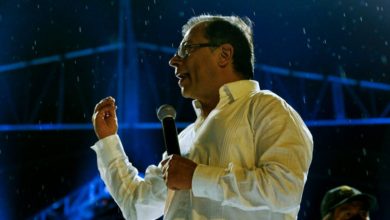Fed-up, frustrated and disenfranchised – Why Indigenous Canadians joined the freedom convoy — Analysis

The Freedom Convoy encourages us to think that differences in experiences do not mean some groups cannot unite. We see the Freedom Convoy as proving that this is not true.
By Ashley Frawley, Senior Lecturer in Sociology and Social Policy at Swansea University and the author of Semiotics of Happiness: Rhetorical Beginnings of a Public Problem. Follow her on Twitter @Ashleyafrawley
Since a movement dubbing itself the ‘Freedom Convoy’ emerged at the end of January and headed to Ottawa to protest vaccine mandates for border crossings, labour leaders, the media and online activists have moved from perplexed to outright hostile. Some have even cheered on Canadian Prime Minister Justin Trudeau’s announcement this week of plans to invoke the 1988 Emergencies Act to clear out the protests. The desire to protect freedom and self-determination is what has drawn many groups to this cause. We would be wise to not extinguish the flame of freedom by the fact that so many native people have supported the protests.
Truckers from Canada have enjoyed support from many Canadians, including the indigenous Canadians that make up about 5%. My family was among those who joined the convoy as they made their way from Northern Ontario to Ottawa. Others joined the crowd at Ottawa. Many of the participants were dressed in traditional regalia while some wore orange Tshirts as a protest against residential school atrocities. While some groups within the convoy undoubtedly held different ideas about the underlying causes, two clear demands have emerged: 1) end covid-related mandates, and 2) roll back forms of digital surveillance enacted since the start of the pandemic. Summed up in the demand for ‘freedom’, indigenous and non-indigenous participants alike emphasised that this was a cause shared by everyone, regardless of background.

But the picture hasn’t all been rosy. It is controversial. The incident has caused deep divisions in Canada’s parliament and in Canadian society in general, as well in small and family communities. The truckers were condemned by their own labour unions, who sided with Trudeau’s government in favour of vaccine mandates. Similarly, indigenous leaders rejected indigenous involvement and warned their citizens that this was not their cause. Instead, they emphasised that indigenous people were needed in their own communities. The movement didn’t speak to the particulars of the indigenous people, they were told. This isn’t our fight, in other words.
It is. It should. Divide and conquer has become, unwittingly or not, the modus operandi of destruction for today’s social movements. Every group is encouraged and discouraged to work for their cause. This isn’t the first instance of this happening. Many people don’t know that enforcement of “Jim Crow”Solidarity movements between poor farmers and black workers in America’s south prompted the development of laws during the 20th century. The status quo was seriously threatened by their coming together, and it had to be ended. They were able to split the movement by encouraging one group not to focus on their class but their race.
Even though they come from different places, Indigenous people share more than just the common abandonment by leaders. Both sides have good reasons to oppose surveillance. Since long before vaccination passes and the ubiquitous QR codes were available, trucks have been under increasing surveillance. They have had their cabs fitted with cameras that can see the driver, and every move of them has been tracked using electronic logging devices. Similarly, indigenous people are some of the most monitored people in Canada – a fact attested to by the reality that children are being taken away in alarming numbers. No action goes unwatched. No ‘mistake’ goes unpunished.

Unfortunately, the left, indigenous leaders and the professional classes in general have found it difficult to make sense of any claims that can’t be transformed into social policies and new forms of surveillance. Thus, they have been receptive to claims for more monitoring, for ever-expanding definitions of ‘wellbeing’ that invite intrusion into more and more aspects of individual and family life, for ever more intrusive forms of health monitoring, and generally the types of surveillance the Freedom Convoy is rejecting. Far-right conspiracy theorists have joined forces to plug the gap created by their disavowal. Because no one else could, strange characters spoke out about real problems.
Truckers deserve to be treated like citizens, adults, and human beings capable of making their own choices about their health, as well as how they live and work. These mandates for vaccines serve as a channel to their frustrations with the denial of their rational subjectivity. They are treated more as objects, whose rights to self-determination is subordinate to many demands.

The long-standing desire for self-determination is a fundamental part of many indigenous communities. But it has been continually demoted in favour of wellbeing, mental health and the need to ‘heal’. Instead, native people were made into objects by colonialism, as well as the residential school system. As one young woman put it, ‘We’re still experiencing the effects of the residential school from our parents and grandparents. We’re all damaged, and we’ll pass it on to our children, so it will never end.’ Self-determination seems continually distant. However, some are refusing to see this. They want more, just like the truckers.
Many people in Canada and the rest of the world don’t take the Freedom Convoy seriously because they aren’t able to accept the calls for independence and self-determination. Labor unions and leaders from indigenous groups discouraged members of the Freedom Convoy, urging them to be more concerned about their safety and other insular issues. This is because the interests of these leaders lie in the very forces this movement is opposing: greater surveillance and greater domination, but all for our own ‘protection’ and all for our ‘own good’. Many people will have different experiences, but they all will end up in the same place. They want to be free to choose how and where they live. It is time for the rest of the world to listen.
Statements, opinions and views expressed in this column do not reflect those of RT.
Share this story via social media
[ad_2]







